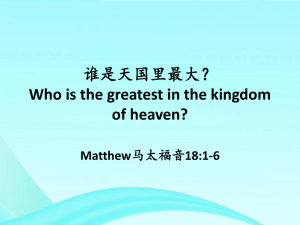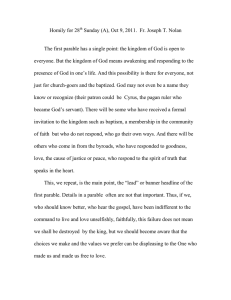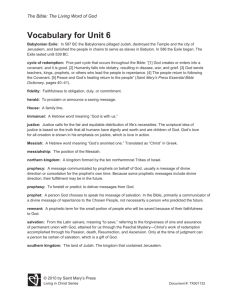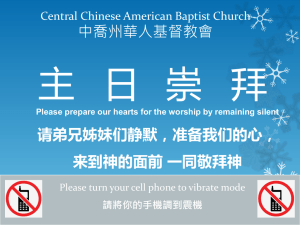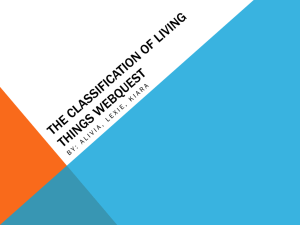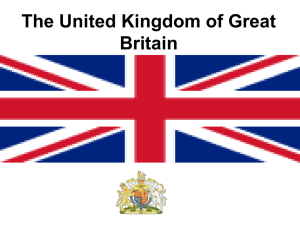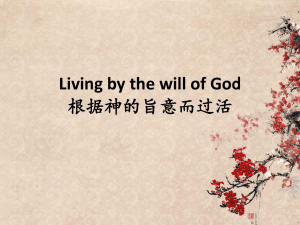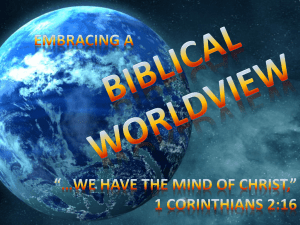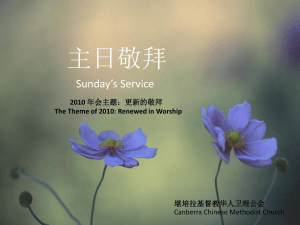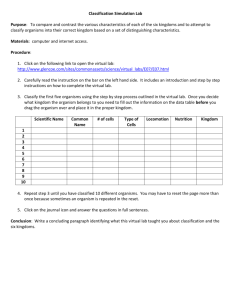A Free Meal?
advertisement
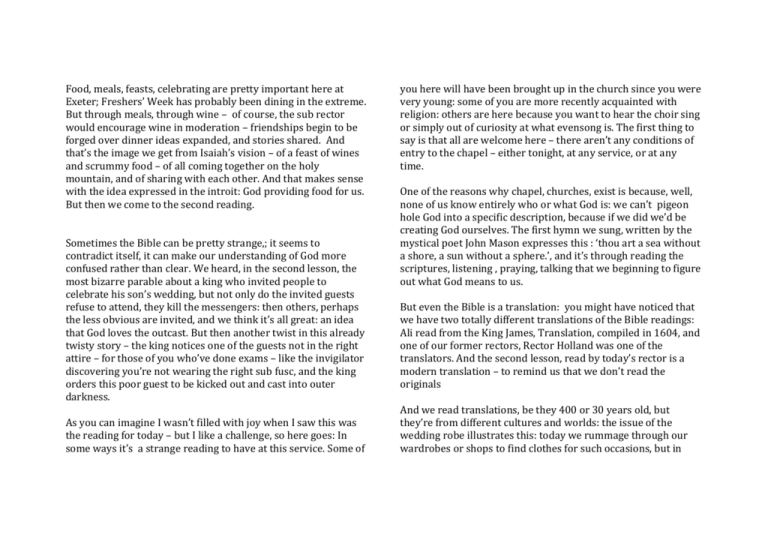
Food, meals, feasts, celebrating are pretty important here at Exeter; Freshers’ Week has probably been dining in the extreme. But through meals, through wine – of course, the sub rector would encourage wine in moderation – friendships begin to be forged over dinner ideas expanded, and stories shared. And that’s the image we get from Isaiah’s vision – of a feast of wines and scrummy food – of all coming together on the holy mountain, and of sharing with each other. And that makes sense with the idea expressed in the introit: God providing food for us. But then we come to the second reading. Sometimes the Bible can be pretty strange,; it seems to contradict itself, it can make our understanding of God more confused rather than clear. We heard, in the second lesson, the most bizarre parable about a king who invited people to celebrate his son’s wedding, but not only do the invited guests refuse to attend, they kill the messengers: then others, perhaps the less obvious are invited, and we think it’s all great: an idea that God loves the outcast. But then another twist in this already twisty story – the king notices one of the guests not in the right attire – for those of you who’ve done exams – like the invigilator discovering you’re not wearing the right sub fusc, and the king orders this poor guest to be kicked out and cast into outer darkness. As you can imagine I wasn’t filled with joy when I saw this was the reading for today – but I like a challenge, so here goes: In some ways it’s a strange reading to have at this service. Some of you here will have been brought up in the church since you were very young: some of you are more recently acquainted with religion: others are here because you want to hear the choir sing or simply out of curiosity at what evensong is. The first thing to say is that all are welcome here – there aren’t any conditions of entry to the chapel – either tonight, at any service, or at any time. One of the reasons why chapel, churches, exist is because, well, none of us know entirely who or what God is: we can’t pigeon hole God into a specific description, because if we did we’d be creating God ourselves. The first hymn we sung, written by the mystical poet John Mason expresses this : ‘thou art a sea without a shore, a sun without a sphere.’, and it’s through reading the scriptures, listening , praying, talking that we beginning to figure out what God means to us. But even the Bible is a translation: you might have noticed that we have two totally different translations of the Bible readings: Ali read from the King James, Translation, compiled in 1604, and one of our former rectors, Rector Holland was one of the translators. And the second lesson, read by today’s rector is a modern translation – to remind us that we don’t read the originals And we read translations, be they 400 or 30 years old, but they’re from different cultures and worlds: the issue of the wedding robe illustrates this: today we rummage through our wardrobes or shops to find clothes for such occasions, but in C1st Palestine the person who issued the invitation also provided you with the robe. Tonight’s second reading is challenging. And it’s ok to have our faith challenged; it’s ok to be confused and bewildered by scripture at time. Christianity isn’t about passively agreeing with everything; instead Christianity is about being in a relationship with God – and all relationships, if they are truly proper relationships will have disagreements – being confused and annoyed by God is ok. The parable is telling us about the kingdom of heaven – a kingdom of mutual respect, of honouring self as well as neighbour, of not screwing people over for a quick gain.; it’s about questions of how to live our lives –ethics. Much of the kingdom of heaven is about living in this world, in the here and now. And membership of this kingdom is open to all: it’s what Matthew was exploring in his gospel, and what we in the chapel do through our worship, talks, and life. Too often we as humans can so easily use God as an excuse for our prejudices and fears; it can be easy to sometimes see God as the bully, imposing his ideas on the world, like the thug in the playground, or the student who claims never to be homesick, or never to feel insecure and who sets up his or her own clique to the exclusion of all others. The vision of God from Isaiah – the God who loves us, who saves us, and who provides for us is one we all prefer; but for this banquet to take place properly, we all have to play our part – not only in eating and drinking, but in rejoicing, and sharing in the joy. And I think that is why the under-dressed guest in included here: because membership of the kingdom of heaven is open to all, but once in, there is an expectation of being open to receiving God’s grace, and an expectation, how ever small, to play our part : to show kindness, to live sustainably, to know God in a true and living way. Too often we find barriers put up by ourselves or by society, but God welcomes us with open arms to share in his feast. The poet George Herbert puts it: Love bade me welcome. Yet my soul drew back Guilty of dust and sin. But quick-eyed Love, observing me grow slack From my first entrance in, Drew nearer to me, sweetly questioning, If I lacked any thing. A guest, I answered, worthy to be here: Love said, You shall be he. I the unkind, ungrateful? Ah my dear, I cannot look on thee. Love took my hand, and smiling did reply, Who made the eyes but I? Truth Lord, but I have marred them: let my shame Go where it doth deserve. And know you not, says Love, who bore the blame? My dear, then I will serve. You must sit down, says Love, and taste my meat: So I did sit and eat.
